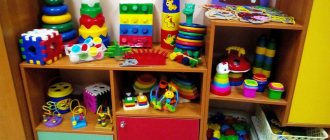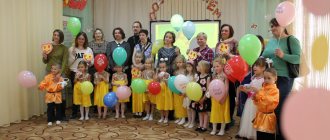The role of musical and theatrical activities: games and exercises
If in the last section we looked at several exercises for developing intonation, now I want to say that it is also important for children to develop their hearing and voices in order to participate in musical performances. For this purpose, you can perform the “Echo” exercise. It comes down to having the child repeat a phrase with the same characteristics that the teacher said. Those. He must repeat the timbre, volume, pitch of the sound. The phrase can be spoken or sung.
Since we are talking about singing, it is important to note that singing helps eliminate a number of speech defects, including swallowing endings and slurred pronunciation. Interesting musical and didactic tasks develop phonetic-phonemic hearing, attention and memory. For this purpose, students can be offered the following games: “Guess the sound”, “Guess the musical instrument”, “Move to the rhythm of the music” and others.
As mentioned above, the development of fine motor skills is closely related to musical and theatrical activities and the development of speech. When a child sings finger songs, his speech is enriched. Fortunately, you can now find quite a lot of such songs on the Internet.
To summarize all of the above, I would like to note that musical and theatrical activities play an important role in the development of speech of a child of primary preschool age. In addition to everything, children develop memory and attention, coordination of movements, and social behavior skills are formed. In addition, from early childhood, pupils are introduced to art and folk culture, and become acquainted with the works of great writers. By playing the role of his character, the child learns to overcome shyness and becomes more confident.
Stages of working on intonation expressiveness
There are several stages in the construction of intonation expressiveness:
- Characteristics of the hero the student will play, repetition of his characteristic movements.
- Training of intonation pronunciation characteristic of a given role.
- General characteristics of speech features of the image.
- Transition into an image through creative techniques (expression of different feelings).
- Performing a poem or work in roles, taking into account the musical accompaniment of the performance.
It is especially effective when children perform a skit not just in pairs, but in a large group. Collective musical and theatrical activities help them learn to cooperate with each other and with adults.
Building intonation expressiveness is important when a specialist works with students. But it is also important to encourage them to engage in independent activities, when they themselves can choose the text, movements, intonation, etc. These are the so-called dramatization games, when they themselves choose the characters they will play, while making up speeches and singing songs.
To work on the expressiveness of speech, it is necessary to organize short five-minute sessions of articulatory gymnastics, performing various exercises. Tongue twisters, speeches and so-called phonopedic and logorhythmic exercises are also suitable, for example:
“One day, “a”, “o”, “u”, “i” went for a walk in the forest. You can count them “a”, “o”, “u”, “i”. Suddenly a bear came out of the forest “a”, “o”, “u”, “i”, And began to roar menacingly And the sounds rushed to run “a”, “o”, “u”, “i”, You and I them can't catch up. We’ll just quietly call “a”, “o”, “u”, “and”, And we’ll quickly return them home.” ,,,,,,,,,,,,,,,,,,,,,,,,,,,,,,,,,,,,,,,,,,,,,,,, ,,,,,,,,,,,,,,,,,,,,,,,,,,,,,,,,,,,,,,,,,,,,,,,, “I say hello everywhere, at home and on the street (turns right and left) I even say “hello” to the neighbor’s chicken (movement “wings”) Hello, the sky is blue (swinging your arms above your head) Hello, the sun is golden (circular movement of your fingers) Hello, free breeze (fan ourselves) Hello, little oak tree (show “little tree”) Hello, morning, (turns left and right) Hello, day, we are not too lazy to say hello.”
Musical theater thus allows you to work on all the components of oral speech of younger preschoolers.







